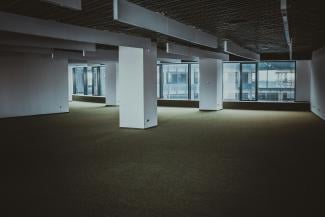
Sergei Wing courtesy of Unsplash.
The Far-Reaching Effects of Commercial Real Estate’s Downward Spiral
The Federal Reserve’s higher interest rates, the work from home trend, ESG distractions, increases in crime, etc., are having far reaching effects on our economy and investors.
Consider the “apocalypse” analysis from NYU and Columbia professors. The research combined working from home data with financial information from real estate investment trusts (REITs), plus other financial information, and predicted, “long-run office valuations that are 39.18% below pre-pandemic levels.”
Right now (May 25, 2023) both New York and San Francisco are reporting vacancy rates exceeding 30%. So, NYU and Columbia professors’ predictions may be pretty accurate. Because of the high levels of mortgage debt employed by real estate investors, top commercial real estate locations are rumored to only have 10% equity left in these properties.
The large amount of leverage used by commercial real estate investors means they are not the only ones that stand to lose a lot if commercial real estate continues this downward spiral. For example, what will happen to the already embattled banks if the commercial real estate market continues to devolve?
Here are some of the potential consequences for banks:
- Banks have a substantial amount of exposure to the commercial real estate market through loans extended to developers, property owners, and investors. If the market collapses, many borrowers may struggle to repay their loans, leading to an increase in defaults. This would result in a rise in non-performing assets on the banks' balance sheets, putting more pressure on their already fragile financial health.
- Commercial real estate often serves as collateral for loans. When property values plummet, it reduces the value of the collateral supporting outstanding loans. This would increase the risk exposure for banks and potentially erode their capital base.
- Banks rely on interest income from loans to generate profits. If there is a significant increase in loan defaults and declining collateral values, banks' ability to lend will be constrained. They will become more cautious and tighten lending standards, making it harder for businesses and individuals to access credit.
- A collapse in the commercial real estate market would likely lead to reduced profitability for banks. With higher loan defaults and lower interest income, banks will experience a decline in earnings. This could impact their ability to generate capital and maintain financial stability. This could lead to more bank failures and the need for substantially more government intervention.
The failure of banks in the scenario of a commercial real estate market collapse can have significant implications for investors. Here's how it could affect them:
- If a bank fails, depositors could face losses on their deposits that exceed the insured limits provided by deposit insurance programs. This means that some portion of their funds may be unrecoverable. Individuals and businesses that had significant deposits in the failed bank could suffer financial losses, impacting their liquidity and ability to meet financial obligations.
- Investors who hold securities issued by failing banks, such as bonds or preferred shares, could face significant losses or even complete write-offs. The value of these investments could decline sharply or become worthless, leading to financial losses for the investors.
If banks and the commercial real estate market were to continue to unravel, it would have significant ramifications for the rest of the economy and investors. Here are some potential outcomes:
- Commercial real estate is a vital sector in the economy, and a sharp decline in property values could have far-reaching effects beyond the banks’ increased loan defaults, and reduced lending. Businesses associated with the sector, such as construction, real estate development, property management, and related industries, would experience layoffs, reduced investments, and financial distress. The overall economic growth rate could slow down and enter a recession.
- The commercial real estate sector employs a significant number of people directly and indirectly. If the market collapses, companies in this sector may downsize, leading to job losses and increased unemployment rates. This could have ripple effects on consumer spending, housing markets, and overall financial stability as individuals struggle to meet their financial obligations.
- Investors who have exposure to commercial real estate assets may suffer significant losses if the market collapses. These investors include union and government pension funds, 401(k) plans, university endowment funds, and other institutional investors. Property values would decline, potentially resulting in negative equity and reduced investment returns. Additionally, if loans default and property values plummet, investors holding real estate investment trusts (REITs), mortgage-backed securities or other structured products tied to commercial real estate could face substantial losses.
- A collapse in the commercial real estate market could trigger increased volatility and risk aversion in financial markets. Investors may become more cautious and seek safer investments, leading to a flight to quality. Stock markets might experience downward pressure as investor sentiment weakens. This could also result in tighter credit conditions and reduced access to capital for businesses across various sectors.
- In a severe crisis, governments may intervene to mitigate the impact on the economy and investors. They might implement stimulus packages, lower interest rates, or provide financial assistance to affected industries and individuals. Government intervention can help stabilize the economy and restore confidence but could also have long-term implications for higher taxes, inflation, and public debt levels.
To hedge against the banking and real estate problems in the scenario of a potential collapse, investors can consider implementing the following strategies:
- One of the most effective ways to hedge against specific risks is to diversify investments across different asset classes or sectors. By spreading investments across stocks, bonds, commodities, real estate, and other asset types, investors can reduce their exposure to any single sector's downturn. This approach helps to mitigate the impact of a potential collapse in the commercial real estate market or banking sector on the overall investment portfolio.
- Investors should conduct thorough risk assessments and due diligence before making investment decisions. This includes analyzing the financial health of banks, real estate developers, and related companies. It's important to have a clear understanding of the risks within the banking and real estate sectors.
- During periods of uncertainty, it can be prudent to focus on high-quality investments. This involves investing in well-established and financially stable banks, real estate companies, and other businesses with strong fundamentals and track records. High-quality investments tend to have better resilience during market downturns and are more likely to recover and perform well in the long run.
- Exploring alternative investments that are less correlated to traditional banking and real estate sectors can be another strategy. Examples include investing in commodities, precious metals, hedge funds, or private equity. These alternative investments may provide diversification and potentially better risk-adjusted returns during challenging market conditions.
- Keeping abreast of market trends, economic indicators, and regulatory developments is crucial. Regularly monitoring the performance of banking and real estate sectors, as well as broader economic indicators, enables investors to adjust their strategies accordingly.
It's important to note that while these strategies can help investors hedge against potential risks, no strategy can eliminate all risks. Investors should carefully assess their risk tolerance, consult with financial advisors, and tailor their investment approach to their individual circumstances and objectives.
In Summary:
A collapse in the commercial real estate market would have significant consequences for banks, investors, and the economy as a whole. If the market collapses, banks would face increased loan defaults, declining collateral values, reduced lending capacity, lower profitability, and potential financial instability. Investors could experience losses on deposits, investment holdings in failing banks, and a decline in market confidence. The economy could suffer from a downturn, increased unemployment, and market volatility. To hedge against these risks, investors can diversify their portfolios, conduct thorough risk assessments, focus on high-quality investments, hedge with alternative investments, and stay informed about market conditions.

